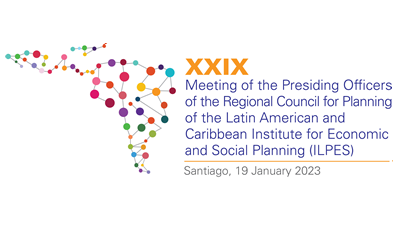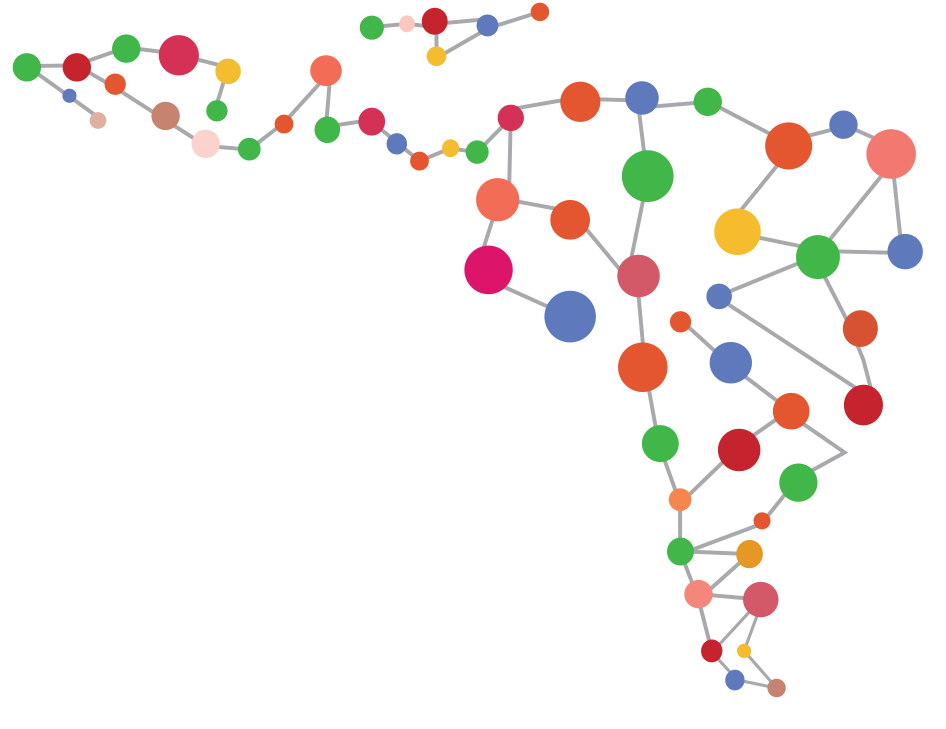Authorities Reaffirm Urgency to Strengthen States’ Institutional Frameworks and Aim for a “New Public Service” Centered on People
Work area(s)
The Seventeenth Conference of Ministers and Chiefs of Planning of Latin America and the Caribbean was inaugurated today at ECLAC headquarters in Santiago, Chile.

Faced with simultaneous, cascading crises, slowed growth and setbacks on various social indicators, States need to strengthen their institutional frameworks and aim for a “new public service” that centers its actions on people and builds citizenship in their territories, making the public interest their key objective and reframing their relationship with development stakeholders. This was the consensus of the authorities gathered at the Seventeenth Conference of Ministers and Chiefs of Planning of Latin America and the Caribbean, inaugurated today at the headquarters of the Economic Commission for Latin America and the Caribbean (ECLAC) in Santiago, Chile.
This conference precedes the XXIX Meeting of the Presiding Officers of the Regional Council for Planning of the Latin American and Caribbean Institute of Economic and Social Planning (ILPES), which will take place on Thursday, January 19. The Conference brings together ministers and high authorities of planning, experts and the general public to debate and discuss practices, experiences and perspectives on planning in the region.
The Conference was inaugurated by Raúl García-Buchaca, Deputy Executive Secretary for Management and Programme Analysis of the Economic Commission for Latin America and the Caribbean (ECLAC) and Hector Alexander, Minister of Economy and Finance of Panama, in his capacity as President of the Regional Council for Planning of the Latin American and Caribbean Institute of Economic and Social Planning (ILPES).
In his opening remarks, Raúl García-Buchaca warned that the challenging global context and outlook for the region are weakening trust in democratic institutions, which are perceived by citizens as incapable of responding to the increasingly complex challenges of development.
“State capacity to rebuild trust is a key element for negotiating private interests in the search for the common good, for reframing power relations in the territory and arriving at the agreements and accords needed to drive a new model of development that ensures a dignified life for everyone,” he affirmed.
He underscored that access to information generated by the State, the systematic mechanisms of citizen participation in decision-making, transparency, dialogue, accountability and collaboration with citizens, particularly youth, can bolster the re-weaving of levels of trust that are currently so weak.
ECLAC’s Deputy Executive Secretary added that, while it is necessary to address the current situation and resolve public problems today, it is also essential that States maintain a long-term view and strengthen citizens’ trust through the collective construction of probable future scenarios that may contribute to the generation of a shared vision for their country and State policies that turn these visions into reality.
“In light of the magnitude of the challenges we are facing in this volatile context, with high levels of uncertainty and multiple crises, public management needs to be not only competent and efficient, but also intelligent and resilient, and therefore, relational and deliberative,” he stated.
He pointed out that the current situation, marked by increasingly slowed economic growth in the region, estimated to reach a rate of 1.3% in 2023, along with persisting poverty rates (32.1% of the total population in the region) and extreme poverty (13.1%) puts these countries far from attaining the targets of the 2030 Agenda and its 17 Goals.
Despite this, the countries of the region continue to support the implementation and following of the 2030 Agenda through a growing number of national voluntary reviews and, more and more, local voluntary reviews, which reflect the rising importance of the territorial dimension of sustainable development.
“For this reason, the call for the Decade of Action is to accelerate achieving the Agenda goals through planned policies that are innovative, coherent and inclusive, involving all development stakeholders,” he asserted.
Minister Héctor Alexander meanwhile stressed the importance of the “new public service,” because it proposes that State action generate public value focused on dialogue about shared values, in addition to responding to and serving citizens through negotiation and intervention among multiple interests, and generating a governmental structure with empathetic and collaborative leadership that builds alliances between private stakeholders, civil society and academia.
“We are convinced that strengthening institutions and their capacities for dialogue with all development stakeholders is the vehicle for the sustainability of State actions, the deepening of democracy and the construction of a culture aimed at the future that is so needed in our countries,” underscored the minister.
The Seventeenth Conference of Ministers and Chiefs of Planning of Latin America and the Caribbean has four panels, in which authorities will discuss foresight as a tool for building innovative and participatory public policies, the open State and citizen participation at the center of the new public service, the role of innovation in public institutions to accelerate the full implementation of the 2030 Agenda Sustainable Development Goals and the challenges of a new public service in the territory.
The conference will also have two side-events to be held on Tuesday, January 17. The first will address the mainstreaming of gender perspective in planning, while the second will be the book presentation of Patrones de desarrollo económico en los seis países de Centroamérica (1950-2018), published by the ECLAC sub-regional headquarters in Mexico.
On Thursday, January 19, the XXIX Meeting of the Presiding Officers of the Regional Council for Planning of the Latin American and Caribbean Institute of Economic and Social Planning (ILPES) will take place.
During this inter-governmental meeting, ECLAC will present its report on ILPES activities since the XVIII meeting of the Regional Council for Planning, held October 19-21, 2021, and will release its working program for 2023 to the countries. It will also cover the preparations for the XIX Meeting of the Regional Council for Planning to be held in 2023.
The Regional Council for Planning is the ECLAC subsidiary body in charge of the substantive guidance of ILPES activities and is composed of the ministers or planning authorities of the United Nations regional commission Member States.
Related content

Latin American and Caribbean Authorities Will Analyze Progress and Challenges Related to Implementing the “New Public Service” in the Region
The XVII Conference of Ministers and Heads of Planning and the XXIX Meeting of the Presiding Officers of the Regional Council for Planning of ILPES will be held on January 17-19 at ECLAC’s…

XXIX Meeting of the Presiding Officers of the Regional Council for Planning of the Latin American and Caribbean (ILPES)
The Presiding Officers of the Regional Council for Planning of the Latin American and Caribbean Institute for Economic and Social Planning (ILPES)meet every two years to review the progress of work…
Country(ies)
- Latin America and the Caribbean
Contact
Public Information Unit
- prensa@cepal.org
- (56 2) 2210 2040

